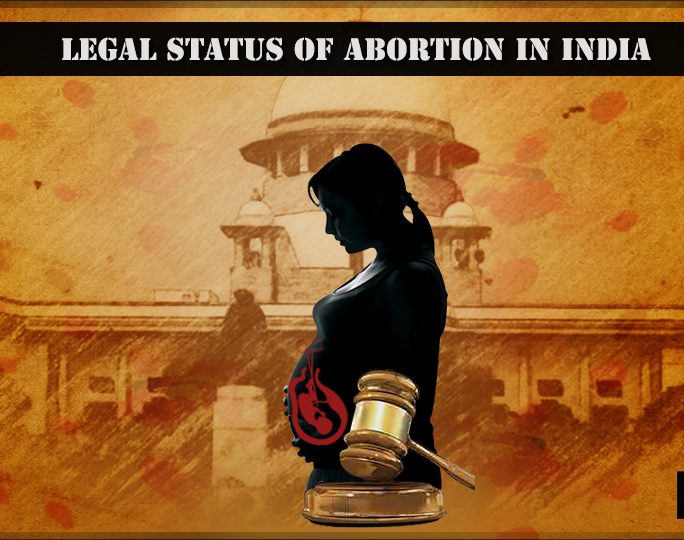This article has been written by Roopsi Bhagat, a student of the Law School, Jammu University.
Table of Contents
Introduction
“There is no freedom, no equality, no full human dignity and parenthood possible for women until they assert and demand control over their own bodies and reproductive process… The right to have an abortion is a matter of individual conscience and conscious choice for the woman concerned.”
–Betty Friedan
Women in India have always been suppressed, they don’t even have the right to self-determination with regard to their body and hence are abstained from aborting the child out of societal pressures and state’s compulsive laws. Restrictions on access to abortion disproportionately impact women due to biological factors as well as societal perception of women as natural child bearers.
Abortion is one of the most controversial ethical issues since it concerns the taking of human life. Ronald Myles Dworkin, an American philosopher, jurist and scholar of United States Constitutional Law has argued that foetus is not complete person from the moment of its conception and he rejected the claim of the opponents of abortion that the unborn has the right to live and abortion is murder or nearly as wrong as murder. He argues that foetus has no interest until the end of the pregnancy as the brain of the foetus is not sufficiently developed until the 26th week, it cannot feel pain which is further supported by scientific claims. The question whether abortion should take place is dependent on the fact that the foetus has developed interests and not on the fact that it will develop interests if no abortion takes place.
The path of progress of the nation starts from the womb of the mother which requires attention and not ignorance and women’s right to bodily integrity outweighs any rights that the foetus, who is a special aggregation of cells with a potential for independent life has.
Abortion– A key reproductive choice: Legal but not a Right
The Medical Termination of Pregnancy Act, 1971 legalised abortion in India upto 20 weeks of pregnancy based on certain conditions and when provided by a registered medical practitioner at a registered medical facility. Post 20 weeks an abortion is only allowed if the pregnancy poses a threat either to the mother or the baby’s life but only after approval from the apex court. Section 3 of MTP Act lays down the conditions under which a pregnancy may be terminated and clearly states doctor’s opinion is must for performing abortion in women. A woman can legally avail abortion if continuation of the pregnancy would involve a risk to the life of the pregnant woman or cause injury to her physical or mental health, if the foetus has severe abnormalities, pregnancy is a result of rape or when pregnancy results from a contraceptive failure in case of a married woman.

Issues in the MTP Act of 1971
Firstly, the Act views women primarily as mothers and pregnancy as natural and inevitable. This is indicated by the provisions of the Act which allow abortion only under exceptional circumstances. The present framing of the Act implies that in exceptional circumstances the interests of the mother take precedence over that of the foetus. However, in the absence of such circumstances the interests of the foetus override that of the woman. It is presumed that in the absence of exceptional circumstances women are happy to continue their pregnancy and expected to continue it.
Secondly, only married women are given abortion rights. The Act expressly excludes unmarried, widow and divorced women. Thus, violative of principle of equality provided under Article 14 of the Indian Constitution. Live-in relations have been declared legal in India after the decision of Payal Sharma v. Superintendent, Nari Niketan Kandri Vihar, Agra and ors. But no amendment has been introduced in the present Act for including women who get conceived from this relation.
So is there an assumption that non-married people do not have sex even when live-in relations are legalised?
Also, Explanation 2 of Section 3 states married women can opt out for pregnancy where she can prove that it is caused due to contraceptive failure. The question arises now how a medical practitioner governs the authenticity of the claim of contraceptive failure.
The two finger test of a rape victim is considered to be violative of Article 21 i.e. Right to Privacy then what prevents the law makers from considering Explanation 2 of Section 3 of MTP Act to be a hindrance in applicability of Article 21?
Thirdly, 20 weeks said period is not sufficient as most abnormalities are picked up between 20th to 24th week. Lots of kidney and brain defects manifest much later than 20 weeks. If a substantial foetal abnormality is detected and the mother doesn’t want to bear life-long caregiving responsibilities and the mental agony associated with it, the law gives her no recourse unless there is prospect of her death.
In Roe v. Wade, the court said that foetus is not a person but “potential life”, thus doesn’t have constitutional rights of its own.
Vesting fetuses with rights that are acceptable against the woman bearing them creates an intrusion on women’s bodies and personal lives.
Need for Amendment of the MTP Act
In recent years there have been several Supreme Court and High Court decisions in India that have made significant strides in recognising the fundamental rights to privacy, dignity, bodily integrity and sexual autonomy.
In KS Puttaswamy v. Union of India, the SC categorically held the exercise of reproductive choices is rooted within the constitutionally protected right of life and personal liberty under Article 21 of the Constitution.
In Navtej Singh Johar v. Union of India, the court highlighted the role that sexual autonomy plays and stated that sexuality could not be reduced to its function as mere means of procreation.
In Joseph Shine v. Union of India, in the idea of a free individual the court stated that right to sexual autonomy and privacy has the stature of a constitutional right.
Through these decisions the SC has located the rights to life, personal liberty, privacy, bodily integrity and autonomy as intertwined with reproductive rights, within the framework of gender justice. It is time now that lawmakers recognise the need to reform the MTP Act so that it can be more inclusive and sensitive towards the plight of women. It is apposite now to strike off the word married from Section 3 and expand the applicability of MTP Act to all women and remove certain other issues which restrict women to exercise freely their right to abort as moving to court for permission to seek abortion after 20 week period involve substantial mental and financial hardships.
Medical professionals argue that when the MTP Act, 1971 was enacted the technology may have allowed for safe abortions only upto the 20 week period. But advancement in medicine and technology today allow for aborting the foetus even beyond 20 week period with no additional risks. Amendment to the MTP Act is required to delete the word “married” preceding “woman” in Section 3 to extend its applicability to all women. Shield of foetal rights cannot be used to cover the deep rooted patriarchal mind-set which still harshly frowns upon pre-marital sex and still retains the opinion that women involved in premarital sex are unclean.
To the argument that allowing abortion beyond 20 weeks would induce sex-selective abortions, Dr Datar writes, “In my 25 years as a Gynaecologist, I have seen that those who want to undergo sex selective abortions do not wait till they cross 20 week period.” Government must take strict measures to control sex selective abortions rather than to put the burden of this on other women ultimately making them suffer by placing sex-selective abortions as one of the excuse for restricting women right to abort.
Conclusion
In India legalising abortion through MTP Act has not yielded expected outcomes. Despite the existence of moderate policies, majority of women still resort to unsafe abortions. This contributes essentially to maternal morbidity and mortality.
What we need from a good law is that it should ensure no woman is turned away or forced into an unsafe abortion. As data suggests, 13 women die everyday in India due to unsafe abortions.
In the words of Swami Vivekanand, “It is impossible to think about the welfare of the world unless the conditions of women is improved.”
LawSikho has created a telegram group for exchanging legal knowledge, referrals and various opportunities. You can click on this link and join:
https://t.me/joinchat/J_0YrBa4IBSHdpuTfQO_sA
Follow us on Instagram and subscribe to our YouTube channel for more amazing legal content.
 Serato DJ Crack 2025Serato DJ PRO Crack
Serato DJ Crack 2025Serato DJ PRO Crack










 Allow notifications
Allow notifications


